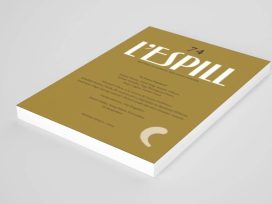Abstracts for L'Espill 22 (2006)
Juli Peretó
Intelligent design and the assault on science
The substitution of scientific scrutiny with obscurantism, the lack of data and remarks, the abandonment of the confidence in reason, and the recognition of the failure of intelligence could never favour knowledge. Why should we recognize that an insurmountable barrier for reason exists in the most intimate spots of cell structures and in the most basic biochemical processes? Creationism, and its last version in the shape of the so-called “theory of intelligent design” as an alternative explanation of the evolutionary theory, is unacceptable because it supposes the surrender of reason. If we dare to think in an evolutionary way, we will advance the knowledge of nature. We have the tools to understand the wonders of biodiversity or to rationalize the threats of pathogens. At the same time, if we admit that an impregnable wall closes natural phenomena to their scientific explanations, we are abandoning the reign of reason forever, and we are falling into the arms of blind faith or fanaticism. The mind is destroyed by the tyranny of the intimate truths over the universal ones. Everything positive got by human intellectual history would then be lost.
Sergio Vila-Sanjuán
Globalization and quality in world publishing
The concentration of publishing has been unstoppable. André Schiffrin has spoken about “publishing without publishers”, with reference to the dissolution of the true editorial projects and the rise of the big groups that operate with narrow economic criteria. This process has been highly criticized, but, nowadays, it has been revised from the inside. On the other hand, an increasing globalization of publishing is clear. Is it an enemy of quality? Not always. The big publishing groups also play the literary cards, although the survival of a core of independent publishing houses seems to be an essential requirement for the future of cultural publishing. Globalization and quality, concentration and independent publishing, profitability and the power of the media, are some of the ideas that define the world publishing scene.
Josep Montserrat
Fundamentalisms
Fundamentalism is dangerous as far as it represents a species of the totalitarian phenomenon. It is not dangerous on its own, but it is dangerous for those individuals who submit. If this submission is voluntary and adult, we cannot do anything – with which authority would we restrict freedom? (Be careful with the “voluntary” and “adult” condition of the submission. It gives us a margin for proceeding). But we can object to the occupation and monopoly of the public space, because any fundamentalism puts the public space in danger by definition, and also precisely because it conquers a space that it is not exactly “ours”. The question of the educational space is not simply incidental, but one of the most sensitive points of the issue.
Francisco Fernández Buey
Humanities and the third culture
If we want to do anything serious in favour of a rational and reasoned resolution of some of the great controversial socio-cultural and ethical-political issues in societies such as ours, in which the techno-scientific complex has got an essential weight, there is no doubt that humanists will need scientific culture to overcome reactive attitudes which are based exclusively on literary traditions. And we should add, as some of the great contemporary scientists used to do, that there is neither any doubt that scientists and technologists will need humanistic training (that is to say, historical-philosophical, methodological, literary, historical-artistic, and so on) in order to overcome the old scientism and its positivist roots, which still tends to consider human progress as a simple derivation of the scientific-technical progress. This is the real reason by which, in the last decades, and from different perspectives, sensitive scientists and engaged humanists are giving so much importance to the investigation of what could be a third culture.
Miquel Barceló
Al Qaida as a modern creature
There has never been a hierarchical centralization regulating one Islamic discourse. On the other hand, the religious variants had been forming locally and regionally. Of course, there were principles and fundaments, above all the legal ones, which everybody recognized as universal. It was also difficult to imagine, almost until the middle of the last century, the emergence of a so-called “cosmopolitan Islam”, bearer of a historical vindication. It is true that the discussion over the evilness of the Western world textually appears at the end of the nineteenth century from Jamal ad-Din al Afgani (who died in 1897). This also represents the foundation of pan-Islamism, according to which Muslims as a nation or a religious community cannot be divided by reasons of birth, language, or government. To be more precise, the diaspora of Muslims in the Western world, unimaginable to these first pan-Islamists, has also produced previously unimaginable effects. The removal of the Muslims to a permanent diaspora from their regional religious cultures has made possible, for the first time, the codification of a simplified Islamic discourse, free from modest local referents. Modern life in the European cities and regions where Muslims have gone to live allows a juxtaposition of groups with different regulations that does not currently seem to affect the ordinary functioning of society. In these places, an extremely deep and technological concentration is produced for everybody, which makes the creation and growth of communications easy.
Published 27 June 2006
Original in English
Contributed by L'Espill © L'Espill Eurozine
PDF/PRINTNewsletter
Subscribe to know what’s worth thinking about.



